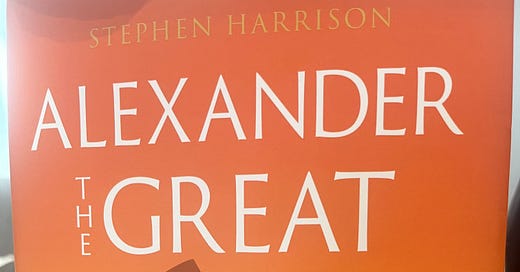Alexander the Great
Stephen Harrison’s contribution to Reaktion Books series ‘ Lives and Legacies’ is a welcome addition to the millions of words written about this much mythologised empire builder.
I first came to Alexander through a children’s book of famous battles, which contained a vividly illustrated and dramatically written account of his great victory over the Persians at Arbela. Later , before any formal academic study I read two of Mary Renault’s beautiful novels which coloured my sense of who Alexander was as a living, breathing, historical human. Only very recently did I discover the Alexander of management theory, who according to the legends of that enterprise was an exemplary leader of men who even negotiated the hazards of the Indian jungle- a place he never visited!
Stephen Harrison, who is a lecturer at Swansea University, has written a much more cautious work, which might disappoint those who are attracted to a maximalist reconstruction of Alexander’s character and psychology, but will bring comfort to anyone who has grown skeptical about the over reliance on the few very late and usually contradictory sources available to those wishing to reconstruct his personality and discover his motives.
He handles this maze with dexterity and humour, introducing the evidence and its problematic nature as he goes along, which means the narrative arc of what Alexander did is kept intact, without ignoring the sediments of conjecture, bias, and retrospective interpretation which have settled upon the events themselves.
Much remains certain. The battles and the brutal realpolitik of imperial conquest. But Harrison wants to reader to come away with a sense of the elusiveness of certainty. Did Alexander show generosity to Darius family after victory? Did he believe himself to be divine, and what even did that mean?
Often this question asking enriches understanding rather than thins it out. We probably will never know why he let his troops destroy Persepolis but he reminds us that it was a far bloodier and brutal affair than many historians are happy to acknowledge.
I think I will return to this, as I am currently in Macedonia and won’t be able to restrain new thoughts and impressions.
I like the way he ends the book with the question that clearly shapes it from beginning to end,
‘ That’s my Alexander- what’s yours?’




